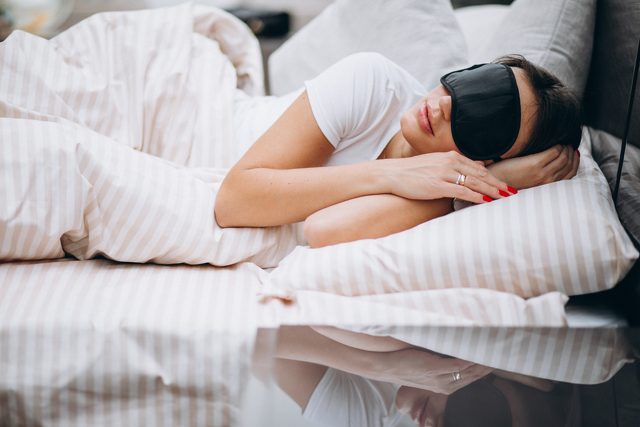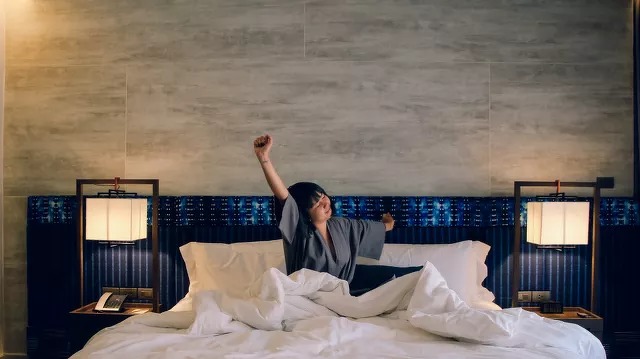Providing holistic and well-designed sleep experiences can help hotels not only improve overall guest satisfaction but strengthen brand identity and generate new revenue streams as well.
Looking back at the history of hospitality, the provision of a good night’s sleep is nothing new, it’s been a core element of hotel operations – if a guest does not sleep well at your hotel, they are unlikely to return. By today sleep has become a key pillar of wellness and longevity trends, and most guests want more than just a bed for the night, they expect an experience that enhances their wellbeing.
Sleep enhancements can boost your brand
The increasing understanding of sleep science has seen the hospitality industry respond with an array of improvements to the primary function of hotels and realize how focusing on sleep can benefit the business. Commercially, with the importance of sleep being so heavily endorsed, concentrating on enhanced sleep in the property is a real justification for increased room rates. Sleep-friendly room categories enable the creation of packages that can be targeted at specific guest profiles. New sleep programs can be used as a marketing tool to increase brand awareness and drive customer acquisition.
Introducing an advanced sleep program can only strengthen wellness programming and for those operators not engaged in the wellness space a focus on enhanced sleep experience helps to capitalize on alternate revenue streams and enter the wellness sphere attracting guests who prioritize wellness.
Specialty sleep rooms and packages can increase revenue
In an example, Yotel has created bolt-on in-room rituals designed to aid relaxation at bedtime and energise guests in the morning. The evening ‘Turn Down’ and morning ‘Turn Up’ packages include a pillow spray, soothing gel eye patches, a gratitude exercise list, plus a QR-code generated relaxing Spotify playlist to send guests to sleep, whilst the morning package features a can of Jimmy’s vegan coffee, Hashtag Organics CBD solution samples, and a daily affirmations exercise, among others.
If designed well, the sleep experience can become a strong feature, even prompting guests to try to replicate the hotel room environment at home through the purchase of pillows, linen, and mattresses from the hotel. Pillow menus, bedding options including weighted blankets (that decrease stress and anxiety) can reduce first night syndrome, a recognized condition with guests not sleeping as well on the initial night of their stay as the mind and body adapts to its new surroundings. Fast-developing bed technology can also help maintain an optimal body temperature, reduce humidity, remove bacteria, and improve air quality through HEPA air filters, an attractive feature for many in a post-Covid era.

Designing the optimal sleep environment
The reduction of distractions, such as light and noise, can also enhance the sleep experience. Blue light emitted by televisions, laptops, tablets, and smartphones before sleep will significantly disrupt our circadian rhythms. In-room light pollution from the TV, mini-bar, a/c units, smoke and fire detectors all add to sleep disruption. This long-term disturbance can lead to tiredness, low energy, depression, and metabolic disorders. Cloaking background noise, such as white noise or pink noise, may improve sleep for older adults, enhance cognitive functions and decrease disturbance from any sudden noises. That said, a complete black out and eliminating all disturbances can pose the risk of oversleeping. Light alarms that steadily fill the room with a warm light can help guests wake up gradually.
Sleep-focused wellness packages connect to guest values
Guests increasingly avoid having too many programmes or a packed agenda during their stay and aim for simpler objectives or even staged phases of a holiday that include rest, recovery and sleep followed by increased levels of activity. Some simply seek a truly outstanding sleep experience.
Examples of operators with sleep tourism initiatives include Zedwell Hotels in London, which developed soundproof and windowless rooms with low-level lighting, air filters, and a device-free and minimalist environment. The Sleep Retreat, a part of the Six Senses Spa Thimphu Wellness Programme, has taken rest and recovery to a whole new and luxurious level. Following a personalized wellness screening, it provides guidance from the resident Sleep Doctor in combination with unique wellness therapies and relaxing treatments, such as Bhutanese hot stone baths, as well as low-intensity training plans to help "restore energy levels and establish a balanced, and sustained, sleep pattern".
Curating sleep-friendly amenities and activities
Hotels today can’t afford neglecting guest expectations when it comes to sleep experience. Improving in-room features, providing a well-designed environment, or launching more sophisticated services to support sleep can bring great benefits to operators as well, which are not to be snoozed at.




